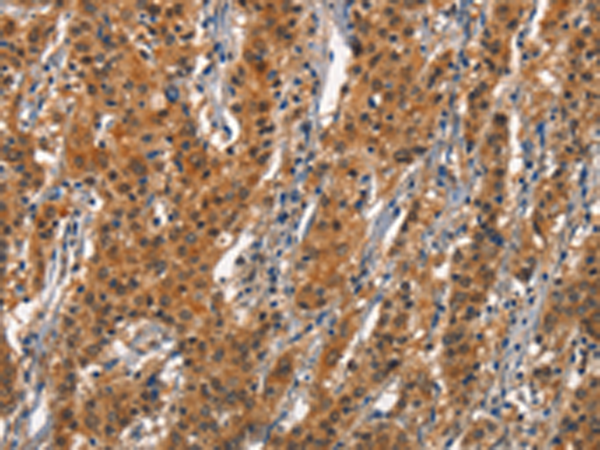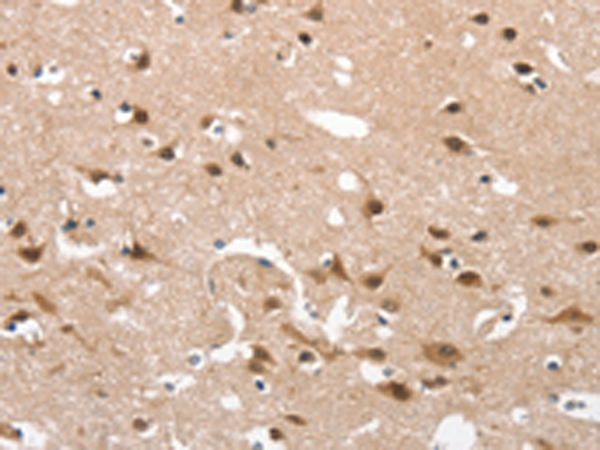

| WB | 咨询技术 | Human,Mouse,Rat |
| IF | 咨询技术 | Human,Mouse,Rat |
| IHC | 1/25-1/100 | Human,Mouse,Rat |
| ICC | 技术咨询 | Human,Mouse,Rat |
| FCM | 咨询技术 | Human,Mouse,Rat |
| Elisa | 1/1000-1/2000 | Human,Mouse,Rat |
| Aliases | M130; MM130 |
| Host/Isotype | Rabbit IgG |
| Antibody Type | Primary antibody |
| Storage | Store at 4°C short term. Aliquot and store at -20°C long term. Avoid freeze/thaw cycles. |
| Species Reactivity | Human |
| Immunogen | Synthetic peptide of human CD163 |
| Formulation | Purified antibody in PBS with 0.05% sodium azide and 50% glycerol. |
+ +
以下是3-4条关于CD163抗体的参考文献及其摘要概括:
---
1. **文献名称**: "CD163 and inflammation: biological, diagnostic, and therapeutic aspects"
**作者**: Etzerodt A, Moestrup SK
**摘要**: 该综述总结了CD163作为血红蛋白-触珠蛋白复合体清道夫受体的生物学功能,强调其在巨噬细胞抗炎表型中的特异性表达,并探讨了其作为炎症性疾病生物标志物及潜在治疗靶点的价值。
2. **文献名称**: "Tumor-associated macrophages express CD163 in colorectal carcinoma via macrophage colony-stimulating factor"
**作者**: Møller HJ, et al.
**摘要**: 研究发现结直肠癌微环境中CD163+肿瘤相关巨噬细胞(TAMs)的高表达与巨噬细胞集落刺激因子(M-CSF)相关,且CD163水平升高与患者预后不良显著相关,提示其作为癌症预后标志物的潜力。
3. **文献名称**: "Pro-inflammatory activation downregulates CD163 expression in macrophages"
**作者**: Fabriek BO, et al.
**摘要**: 实验表明,促炎因子(如LPS和IFN-γ)可显著下调巨噬细胞表面CD163的表达,提示CD163在炎症调控中的动态作用及其在疾病状态(如败血症)中的病理意义。
4. **文献名称**: "Targeting CD163 with antibody-drug conjugates for cancer therapy"
**作者**: Kawamura K, et al.
**摘要**: 研究开发了一种靶向CD163的抗体-药物偶联物(ADC),在实体瘤模型中显示特异性杀伤CD163+巨噬细胞的能力,为基于CD163的肿瘤免疫治疗提供了新策略。
---
以上文献涵盖CD163的基础生物学、疾病关联及治疗应用,均发表于权威期刊(如*Blood*、*Frontiers in Immunology*等),可为进一步研究提供方向。
CD163. a member of the scavenger receptor cysteine-rich (SRCR) superfamily, is a transmembrane glycoprotein predominantly expressed on monocytes and tissue-resident macrophages. It contains nine extracellular SRCR domains, which mediate its interaction with hemoglobin-haptoglobin (Hb-Hp) complexes during erythrophagocytosis. CD163 plays a critical role in anti-inflammatory processes by facilitating the clearance of free hemoglobin, thereby mitigating oxidative tissue damage. Its expression is tightly regulated by inflammatory stimuli: pro-inflammatory cytokines (e.g., TNF-α) downregulate it, while anti-inflammatory mediators (e.g., glucocorticoids or IL-10) upregulate it.
As a marker of M2-polarized macrophages, CD163 is implicated in tissue repair, immune regulation, and resolution of inflammation. Its soluble form (sCD163), shed by ADAM17-mediated cleavage, serves as a biomarker for macrophage activation in conditions like sepsis, atherosclerosis, and chronic liver disease. CD163 antibodies are essential tools in research and diagnostics, enabling the identification of macrophage subsets in immunohistochemistry, flow cytometry, and Western blotting. They also aid in studying CD163's role in diseases such as cancer, where tumor-associated macrophages overexpressing CD163 correlate with immunosuppression and poor prognosis.
Antibodies targeting specific epitopes or isoforms help elucidate CD163’s functional diversity across tissues and pathological contexts, underscoring its therapeutic and diagnostic potential.
×